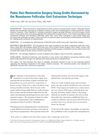 29 citations,
February 2017 in “International Journal of Women's Dermatology”
29 citations,
February 2017 in “International Journal of Women's Dermatology” Women with excessive male-pattern hair growth should get a full hormone check-up to find and treat any underlying issues, considering both medical and emotional aspects.
 3 citations,
November 2021 in “Applied Microscopy”
3 citations,
November 2021 in “Applied Microscopy” Hair microscopy is a simple and cost-effective method to help diagnose systemic diseases in children.
 42 citations,
June 2015 in “Gynecological Endocrinology”
42 citations,
June 2015 in “Gynecological Endocrinology” Women with PCOS often have mood disorders and a lower quality of life, and treatment should focus on both physical and mental health.
 7 citations,
August 2020 in “Scientifica”
7 citations,
August 2020 in “Scientifica” Most HIV-positive patients had skin problems, and conditions like oral thrush and boils were linked to weaker immune systems.
 16 citations,
April 2014 in “Expert Opinion on Pharmacotherapy”
16 citations,
April 2014 in “Expert Opinion on Pharmacotherapy” Teriflunomide is an effective and safe first-line oral treatment for relapsing multiple sclerosis.
 June 2024 in “Australasian Journal of Dermatology”
June 2024 in “Australasian Journal of Dermatology” Tofacitinib is safe and effective for treating moderate-to-severe alopecia areata.
 16 citations,
March 2020 in “Journal of The American Academy of Dermatology”
16 citations,
March 2020 in “Journal of The American Academy of Dermatology” Oral bicalutamide is safe and effective for female hair loss.
 April 2012 in “Informa Healthcare eBooks”
April 2012 in “Informa Healthcare eBooks” Telogen effluvium is a common hair loss condition where many hairs enter the resting phase, often not noticeable until significant loss occurs, and treatment focuses on the underlying cause.
 1 citations,
May 2015 in “Primary Health Care”
1 citations,
May 2015 in “Primary Health Care” Effective acne treatment varies by type, with topical and oral medications showing strong evidence, and patient education and support are crucial.
 July 2023 in “Journal of medical and health studies”
July 2023 in “Journal of medical and health studies” A 3-year-old with vitamin D-resistant rickets and severe hair loss died despite treatment, highlighting the need for improved management of the condition.
 1 citations,
February 2023 in “Daehan ui'sa hyeobhoeji/Daehan uisa hyeopoeji”
1 citations,
February 2023 in “Daehan ui'sa hyeobhoeji/Daehan uisa hyeopoeji” Primary healthcare clinics are key in managing chemotherapy side effects using various medications and treatments.
 11 citations,
February 2008 in “British journal of nursing”
11 citations,
February 2008 in “British journal of nursing” Idiopathic hirsutism causes excessive hair growth in women, can be treated with medication and hair removal, but cannot be fully reversed.
 1 citations,
October 2013 in “Actas Dermo-Sifiliográficas”
1 citations,
October 2013 in “Actas Dermo-Sifiliográficas” Customized medications made through compounding can be beneficial for various skin conditions but require careful regulation and collaboration between doctors and pharmacists.
 30 citations,
January 2020 in “Journal of The American Academy of Dermatology”
30 citations,
January 2020 in “Journal of The American Academy of Dermatology” Fibrosing alopecia in a pattern distribution is a hair loss condition often confused with other types, requiring early treatment but usually not resulting in significant hair regrowth.
 12 citations,
May 2017 in “Medicine”
12 citations,
May 2017 in “Medicine” Oral isotretinoin was recommended for a 21-year-old woman with severe acne.
 December 2024 in “African Journal of Biomedical Research”
December 2024 in “African Journal of Biomedical Research” Combining lifestyle changes and medication is most effective for managing PCOS symptoms.
 55 citations,
July 2013 in “Dermatologic therapy”
55 citations,
July 2013 in “Dermatologic therapy” Some dermatological medications can impair male fertility, so consult a doctor before trying to conceive.
 November 2022 in “CARDIOMETRY”
November 2022 in “CARDIOMETRY” A group has developed therapies that show promise for treating cancer and various other conditions.
 5 citations,
February 2013 in “Expert Review of Dermatology”
5 citations,
February 2013 in “Expert Review of Dermatology” New acne treatments include combination creams, advanced retinoids, and light therapies, focusing on safety and patient adherence.
 4 citations,
January 2024 in “JEADV. Journal of the European Academy of Dermatology and Venereology/Journal of the European Academy of Dermatology and Venereology”
4 citations,
January 2024 in “JEADV. Journal of the European Academy of Dermatology and Venereology/Journal of the European Academy of Dermatology and Venereology” Baricitinib and ritlecitinib are recommended for severe alopecia areata, with other treatments available off-label.
 November 2023 in “Frontiers in pharmacology”
November 2023 in “Frontiers in pharmacology” Drug repositioning offers hope for new, affordable treatments for a genetic skin disorder called ARCI.
 24 citations,
January 2013 in “Indian Journal of Dermatology, Venereology and Leprology”
24 citations,
January 2013 in “Indian Journal of Dermatology, Venereology and Leprology” Hormonal treatment is effective for women with acne not helped by usual treatments, especially if they have hormonal imbalances.
 March 2024 in “Dermatology and therapy”
March 2024 in “Dermatology and therapy” AA patients with comorbid conditions face more severe hair loss and need specific treatments.

Individualized treatment plans, including lifestyle changes and specific medications, are crucial for managing PCOS in adolescents.
 November 2023 in “Aktualʹnì problemi sučasnoï medicini”
November 2023 in “Aktualʹnì problemi sučasnoï medicini” The guidelines suggest using various treatments, including antidepressants and steroids, for alopecia areata and discuss the condition's genetic and immune aspects.
 14 citations,
January 2014 in “Journal of Cutaneous and Aesthetic Surgery”
14 citations,
January 2014 in “Journal of Cutaneous and Aesthetic Surgery” Scalp Roller therapy helped improve hair growth in patients with hard-to-treat alopecia areata.
 6 citations,
August 2023 in “European journal of endocrinology”
6 citations,
August 2023 in “European journal of endocrinology” The 2023 guideline advises a detailed approach for PCOS, focusing on early detection, lifestyle and medical treatments, and managing health risks.
 February 2018 in “Dermatologic Surgery”
February 2018 in “Dermatologic Surgery” Nonshaven follicular unit extraction is a highly satisfactory method for restoring pubic hair.
 June 2024 in “British Journal of Dermatology”
June 2024 in “British Journal of Dermatology” PRP with topical minoxidil is the most effective treatment for increasing hair density in androgenetic alopecia.
 1 citations,
September 2018 in “European Journal of Cancer Prevention”
1 citations,
September 2018 in “European Journal of Cancer Prevention”






























